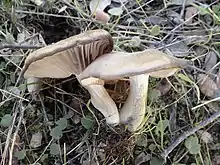Entoloma prunuloides
Entoloma prunuloides is a species of agaric (gilled mushroom) in the family Entolomataceae. It has been given the recommended English name of Mealy Pinkgill, based on its distinctive smell.[2] The species has a European distribution, occurring mainly in agriculturally unimproved grassland.[1] Threats to its habitat have resulted in the Mealy Pinkgill being assessed as globally "vulnerable" on the IUCN Red List of Threatened Species.[1]
| Mealy Pinkgill | |
|---|---|
 | |
| Entoloma prunuloides, Portugal | |
| Scientific classification | |
| Domain: | Eukaryota |
| Kingdom: | Fungi |
| Division: | Basidiomycota |
| Class: | Agaricomycetes |
| Order: | Agaricales |
| Family: | Entolomataceae |
| Genus: | Entoloma |
| Species: | E. prunuloides |
| Binomial name | |
| Entoloma prunuloides | |
| Synonyms | |
| |
Taxonomy
The species was first described by Swedish mycologist Elias Magnus Fries in 1821 as Agaricus prunuloides. French mycologist Lucien Quélet transferred it to the genus Entoloma in 1872.
Description
Basidiocarps are agaricoid, up to 80 mm (3 in) tall, the cap convex to flat and broadly umbonate, up to 70 mm (2.75 in) across. The cap surface is smooth, finely fibrillose, cream to ochraceous grey. The lamellae (gills) are white becoming pink from the spores. The stipe (stem) is smooth, finely fibrillose, white, lacking a ring. The spore print is pink, the spores (under a microscope) multi-angled, inamyloid, measuring about 6.5 to 8 by 6.5 to 8 μm. The whole fungus has a distinctive, mealy smell.[3]
Similar species
Entoloma ochreoprunuloides has the same mealy smell but differs in its darker, grey-brown cap.[4]
Distribution and habitat
The Mealy Pinkgill is rare but widespread in Europe.[1] Like many other European pinkgills, it occurs in old, agriculturally unimproved, short-sward grassland (pastures and lawns).
Conservation
Entoloma prunuloides is typical of waxcap grasslands, a declining habitat due to changing agricultural practices. As a result, the species is of global conservation concern and is listed as "vulnerable" on the IUCN Red List of Threatened Species.[1]
References
- Mešić, A. "Entoloma prunuloides. The IUCN Red List of Threatened Species".
- Holden L. (July 2014). "English names for fungi 2014". British Mycological Society. Retrieved 2016-02-06.
- Noordeloos, M.E. (1992). Fungi Europaei 5: Entoloma. Italy: Libreria editrice Giovanna Biella.
- Morgado LN, Noordeloos ME, Lamoureux Y, Geml J (2013). "Multi-gene phylogenetic analyses reveal species limits, phylogeographic patterns, and evolutionary histories of key morphological traits in Entoloma (Agaricales, Basidiomycota)". Persoonia. 31: 159–178. doi:10.3767/003158513X673521. PMC 3904048. PMID 24761041.
